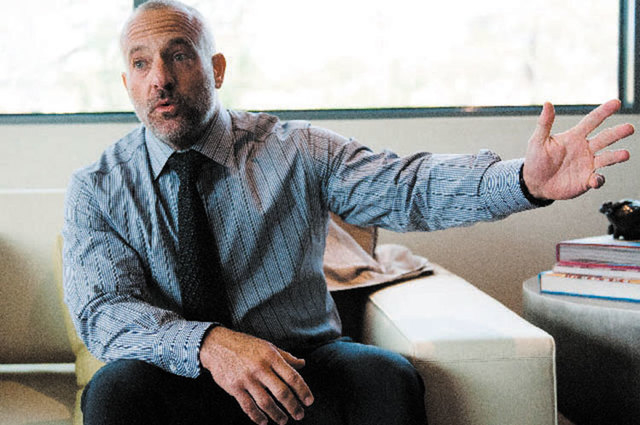UFC advocates drastic action on drug testing

Ultimate Fighting Championship executives laid out plans Wednesday to deal with a recent wave of positive drug tests in the organization.
The UFC will advocate athletic commissions to increase penalties, expand funding for out-of-competition testing and implement random testing for all 585 athletes on the company’s roster.
At a news conference at Red Rock Resort, UFC CEO Lorenzo Fertitta said the time has come to take drastic action.
“Given the recent spate of high-profile cases, we felt like we needed to do this sooner rather than later,” Fertitta said. “For the good of the sport, for the integrity of the sport, for what we’re trying to do here, we needed to address this issue ASAP.”
While the UFC is still looking at the legal issues involved with its planned random testing program, which will be run in conjunction with one of the major drug-testing agencies and begin July 1, athletic commissions still will play the major role in regulating events within their jurisdiction.
Fertitta and UFC president Dana White said they will encourage regulating bodies to adopt a minimum two-year ban to fighters who test positive.
Currently, the Nevada Athletic Commission typically gives out suspensions ranging from six months to one year for first-time offenders.
At a meeting Tuesday, the NAC agreed to assemble a panel discussion to explore the possibility of increased penalties.
NAC executive director Francisco Aguilar, who was in attendance for the UFC’s announcement, said a two-year ban is not out of the realm of possibility.
“I don’t think we’re afraid of going multiyear,” he said. “That’s the reason we’re going to have the panel discussion is because I believe there’s a feeling among commissioners that we need to go further than what we currently do.”
Any increased penalties adopted by the NAC would apply to all combat sports licensees in the state, not just UFC fighters.
Aguilar applauded the steps the UFC is trying to take.
“I think we all have the same goal and ambition; it’s just a question of how we’re going to get there,” he said. “I think our commission is ready to get to work. From our actions and discussions the last couple of months, you’ve seen we’re going to hit this head on.”
Athletic commissions still will oversee testing for individual events, except when the UFC self-regulates events in areas where no commission exists.
Along with fight-night testing, the UFC funds several athletic commissions to do out-of-competition testing of its athletes. It will now do so for all main events and title fights.
Fertitta said the message the organization is trying to send should be clear.
“This definitely should be a call out to all of the athletes on our roster that you will be tested both in-competition and out-of-competition, and if you are using performance-enhancing drugs, you will be caught and there will be significant penalties,” Fertitta said.
Several fighters immediately took to social media to show support for the ramped up efforts to catch cheaters in the sport.
“Today is a great day for the sport of mixed martial arts. Excellent work,” UFC middleweight Michael Bisping said on Twitter.
Former UFC lightweight champion Benson Henderson said he would be first in line to take a test.
“Hey kids #DontDoDrugs,” Henderson tweeted. “Even UFC is saying so finally.”
Fertitta said there is no way to know how much money the testing will cost the company, but expects it to be “several million dollars.”
“Whatever it is, it is,” Fertitta said.
The UFC spent approximately $500,000 funding tests in 2013 and 2014. Fertitta acknowledged the expanded commitment will not solve the problem completely or immediately.
“Honestly? It’s probably going to get worse before it gets better,” Fertitta said. “But we have to put these procedures in place to eventually make it better. It’s going to be a bumpy road, but we’re committed to making this happen.”
Former UFC middleweight champion Anderson Silva has been the highest-profile fighter to fail a test for performance-enhancing drugs.
He first tested positive on an out-of-competition test last month, but the results weren’t available from the lab until after he defeated Nick Diaz by unanimous decision Jan. 31 at the MGM Grand Garden. Silva’s fight-night test also was positive.
Fertitta and White insisted Silva’s test failure was not the sole reason for the introduction of sweeping reforms, but White did admit the result shook him up.
“That shocked the entire MMA community and sports world,” he said. “It shocked me. We were pretty blown away by it. Now we’re going to dig in.”
Welterweight Hector Lombard also failed a post-fight drug test administered by the NAC last month for steroids. Diaz and light heavyweight champion Jon Jones failed tests for recreational drugs.
“Our current methods are catching athletes using PEDs,” Fertitta said. “Although we feel confident that the in-competition (testing) has been effective, we recognize the need for a more robust out-of-competition plan in accordance with athletic commissions and regulatory bodies.
“Simply put, we can do better. We’ve all seen similar challenges in the world of sports. And consequently, we see that the UFC is no more immune to performance-enhancing drug use than any other major sport.”
NOTES — The UFC also used Wednesday to make several major fight announcements. Jones will defend his belt against Anthony Johnson in the main event of UFC 187 on May 23 at the MGM Grand. A middleweight title bout between Vitor Belfort and champion Chris Weidman also will take place on the card.
Robbie Lawler will defend his welterweight title against Rory MacDonald in the main event of UFC 189 on July 11 at the MGM Grand. The card also features a previously announced featherweight title fight between Conor McGregor and champion Jose Aldo.
Contact reporter Adam Hill at ahill@reviewjournal.com or 702-224-5509. Follow him on Twitter: @adamhilllvrj.
RELATED:
UFC’s Silva, Diaz, Lombard get temporary suspensions












